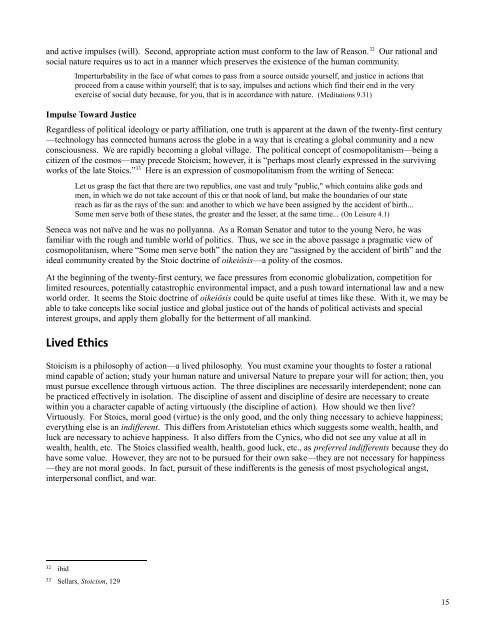Self-Coherence: - College of Stoic Philosophers
Self-Coherence: - College of Stoic Philosophers
Self-Coherence: - College of Stoic Philosophers
You also want an ePaper? Increase the reach of your titles
YUMPU automatically turns print PDFs into web optimized ePapers that Google loves.
and active impulses (will). Second, appropriate action must conform to the law <strong>of</strong> Reason. 32 Our rational andsocial nature requires us to act in a manner which preserves the existence <strong>of</strong> the human community.Imperturbability in the face <strong>of</strong> what comes to pass from a source outside yourself, and justice in actions thatproceed from a cause within yourself; that is to say, impulses and actions which find their end in the veryexercise <strong>of</strong> social duty because, for you, that is in accordance with nature. (Meditations 9.31)Impulse Toward JusticeRegardless <strong>of</strong> political ideology or party affiliation, one truth is apparent at the dawn <strong>of</strong> the twenty-first century—technology has connected humans across the globe in a way that is creating a global community and a newconsciousness. We are rapidly becoming a global village. The political concept <strong>of</strong> cosmopolitanism—being acitizen <strong>of</strong> the cosmos—may precede <strong>Stoic</strong>ism; however, it is “perhaps most clearly expressed in the survivingworks <strong>of</strong> the late <strong>Stoic</strong>s.” 33 Here is an expression <strong>of</strong> cosmopolitanism from the writing <strong>of</strong> Seneca:Let us grasp the fact that there are two republics, one vast and truly "public," which contains alike gods andmen, in which we do not take account <strong>of</strong> this or that nook <strong>of</strong> land, but make the boundaries <strong>of</strong> our statereach as far as the rays <strong>of</strong> the sun: and another to which we have been assigned by the accident <strong>of</strong> birth...Some men serve both <strong>of</strong> these states, the greater and the lesser, at the same time... (On Leisure 4.1)Seneca was not naïve and he was no pollyanna. As a Roman Senator and tutor to the young Nero, he wasfamiliar with the rough and tumble world <strong>of</strong> politics. Thus, we see in the above passage a pragmatic view <strong>of</strong>cosmopolitanism, where “Some men serve both” the nation they are “assigned by the accident <strong>of</strong> birth” and theideal community created by the <strong>Stoic</strong> doctrine <strong>of</strong> oikeiôsis—a polity <strong>of</strong> the cosmos.At the beginning <strong>of</strong> the twenty-first century, we face pressures from economic globalization, competition forlimited resources, potentially catastrophic environmental impact, and a push toward international law and a newworld order. It seems the <strong>Stoic</strong> doctrine <strong>of</strong> oikeiôsis could be quite useful at times like these. With it, we may beable to take concepts like social justice and global justice out <strong>of</strong> the hands <strong>of</strong> political activists and specialinterest groups, and apply them globally for the betterment <strong>of</strong> all mankind.Lived Ethics<strong>Stoic</strong>ism is a philosophy <strong>of</strong> action—a lived philosophy. You must examine your thoughts to foster a rationalmind capable <strong>of</strong> action; study your human nature and universal Nature to prepare your will for action; then, youmust pursue excellence through virtuous action. The three disciplines are necessarily interdependent; none canbe practiced effectively in isolation. The discipline <strong>of</strong> assent and discipline <strong>of</strong> desire are necessary to createwithin you a character capable <strong>of</strong> acting virtuously (the discipline <strong>of</strong> action). How should we then live?Virtuously. For <strong>Stoic</strong>s, moral good (virtue) is the only good, and the only thing necessary to achieve happiness;everything else is an indifferent. This differs from Aristotelian ethics which suggests some wealth, health, andluck are necessary to achieve happiness. It also differs from the Cynics, who did not see any value at all inwealth, health, etc. The <strong>Stoic</strong>s classified wealth, health, good luck, etc., as preferred indifferents because they dohave some value. However, they are not to be pursued for their own sake—they are not necessary for happiness—they are not moral goods. In fact, pursuit <strong>of</strong> these indifferents is the genesis <strong>of</strong> most psychological angst,interpersonal conflict, and war.32ibid33 Sellars, <strong>Stoic</strong>ism, 12915
















